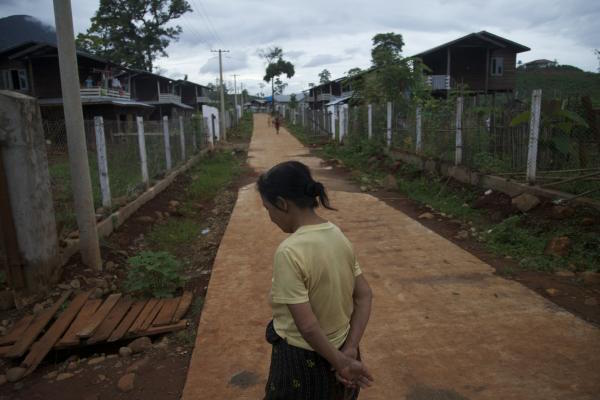
A Kachin woman walks in a Chinese-built village for residents forcibly relocated for the planned Myitsone hydroelectric dam. Photo: Jason Motlagh. Burma, 2012.
Fan Li
Many may deem that the Burmese government’s decision to suspend the Myitsone Dam is a positive signal of its willingness to listen to and work in the interests of the people, but the truth might be different from exceptions, for concrete evidence can be barely seen that affected people’s life is improved due to the halt. The real intention of the government may not be as simple as to merely respect “the people’s will”.
The Myitsone Dam hydro-power project in Burma, jointly invested by the state Myanmar Ministry of Electric Power, the privately-owned Asia World Company of Burma and the China Power Investment Corporation, is located one mile below the confluence of the Mali and N’Mai rivers in Kachin State, the source of the Irrawaddy River. The dam will become the fifteenth largest hydro-power station in the world, if it is completed in 2019 as scheduled.
The dam is expected to flood 447 square kilometers including 47 villages, and as a result about 11,800 local residents have to be relocated in the newly-built resettlement villages. Besides, the dam’s reservoir would submerge historical temples, churches and cultural heritage sites important to Kachin identity, including what is widely recognized as the birthplace of Burma. It will also irreversibly damage Burma’s key river system, given the affected region is one of the world’s top biodiversity hotspot and a global conservation priority.
In short, this hydro-power project has been considered as one of the most controversial development projects in the Burmese history, due to its enormous flooding area, environmental impacts, numerous relocated villagers, threats to historical and cultural sites, and the disproportionate distribution of electricity output between the two countries (90% of its electricity would be exported to China). The public opposition against the project was growing continuously even before the construction actually began.
Suddenly suspended
Unexpectedly on 30th September 2011 the Burmese president Thein Sein announced that “the construction of Myitsone Dam will be suspended” during the term of his government. The reason given was that a government “elected by the people” has to respect “the people’s will”. The decision of suspension received widespread praise at both domestic and international levels and particularly welcomed by western nations including EU and the United States. It is even perceived as a huge success for civil society groups in Burma, China and internationally which symbolizes a shift towards a higher level of democracy in the Burmese military governance.
But is Burmese government really “bold” enough to stand up against China for the sake of “people’s desire”? In a way, the achievements behind the mass media spotlight might be a bit exaggerated. The ultimate fate of the Myitsone Dam remains uncertain until the general election in November this year comes, since the construction is only temporarily halted during the Thein’s term. Hence the unsettled puzzle is still left for the next government, owing to lack of courage to face the problem directly.
Balancing pressure
On one hand, the Thein government is under the pressure of domestic public protests against this project as aforementioned; on the other hand, the government is unlikely to move ahead too far to undermine the cordial relations with China, since it is believed that Burma can enormously benefit from Chinese trade and investment. The strengthened relations to Western countries might give Burmese government more autonomy to oppose China.
Nevertheless simply hoping western countries could replace China in terms of investment and economic cooperation is short-sighted, not only because China has geographic advantages, but also because Chinese investment usually tends to have lower threshold without many additional obligations, which could be a main consideration for developing countries. Accordingly, Thein has made efforts to maintain a cordial relationship with China in practice for guaranteeing other dams to proceed. After all, though the role that China plays in the development of South-eastern Asia is highly controversial, it cannot be ignored that China brings about plenty of opportunities for the countries to reduce poverty, like infrastructure constructions that can boom the local economy and create job opportunities. For the resettled people, there will be 24-hour electricity, a rarity in much of Burma, in the relocated villages after the completion of the dam. The suspension seems more like a tactics to distract the public attention temporarily instead of a genuine fulfillment of “people’s will”. In this dilemma, there appears no more feasible solutions for the Thein government to choose from to perfectly balance the interests of different parties.
Still waiting for compensation
Some may claim that the suspension at least wins over time for the government to tackle the public opposition and strive for a better life of the relocated Kachin people. It turns out that too much time had passed, but too few changes has occurred to redress the lands and livelihoods taken from them. Even though the project is not currently under construction, they are prohibited by the government to move back to the original lands their life used to rely on. It was expected that the continuation of the project would only harm local communities and benefit the government, because local communities lacked access to claiming their due rights. However, the suspension did not bring them tangible benefits either.
Unfortunately, the relocated people have to continue with the suffering, regardless of resumption of the project or not, for is is unlikely for them to recover their original lifestyle. China has consistently made efforts for the resumption of the project, by steadfastly convincing the Burmese of the huge economic and social benefits of the dam. Burma is estimating whether it is fully prepared for the legal, financial and diplomatic consequences if the project is cancelled permanently. But compared to the political situations, the local communities are obviously more concerned about gaining adequate compensation and how they can be able to have a standard living under the new conditions.
Fan Li is an intern at the Fivas office in the fall of 2015. He is a master student at the Norwegian Centre for Human Rights at the University of Oslo.


 Vannets kretsløp:
Vannets kretsløp:
 Funksjon:
Funksjon: Hovedutfordringer:
Hovedutfordringer: